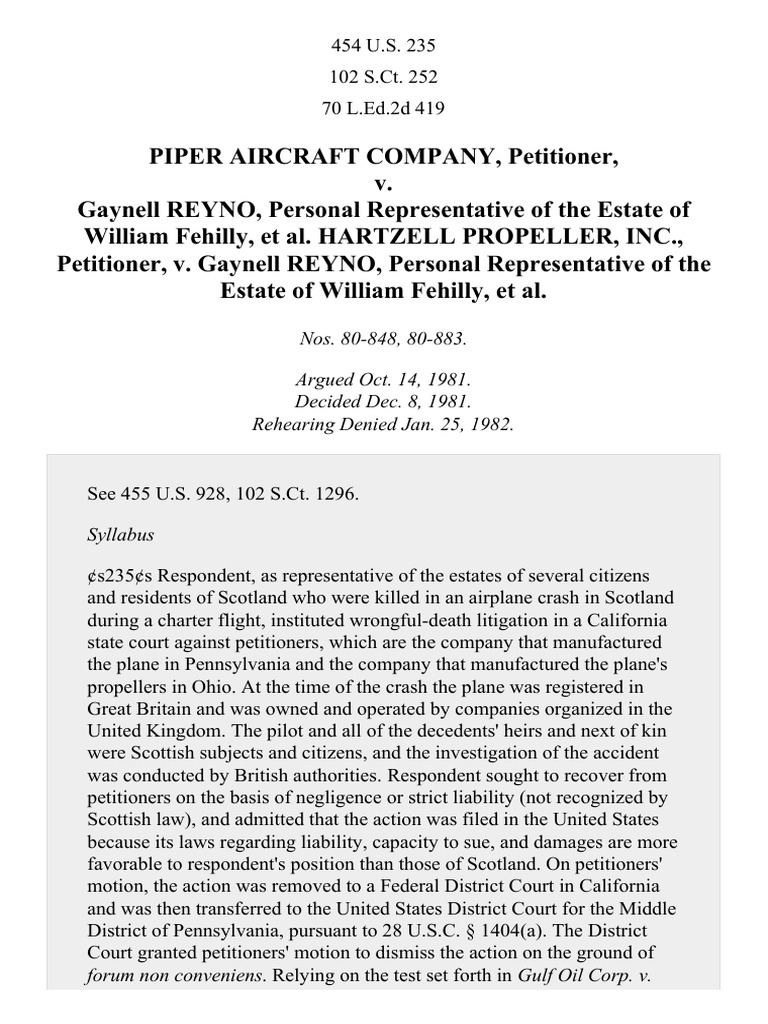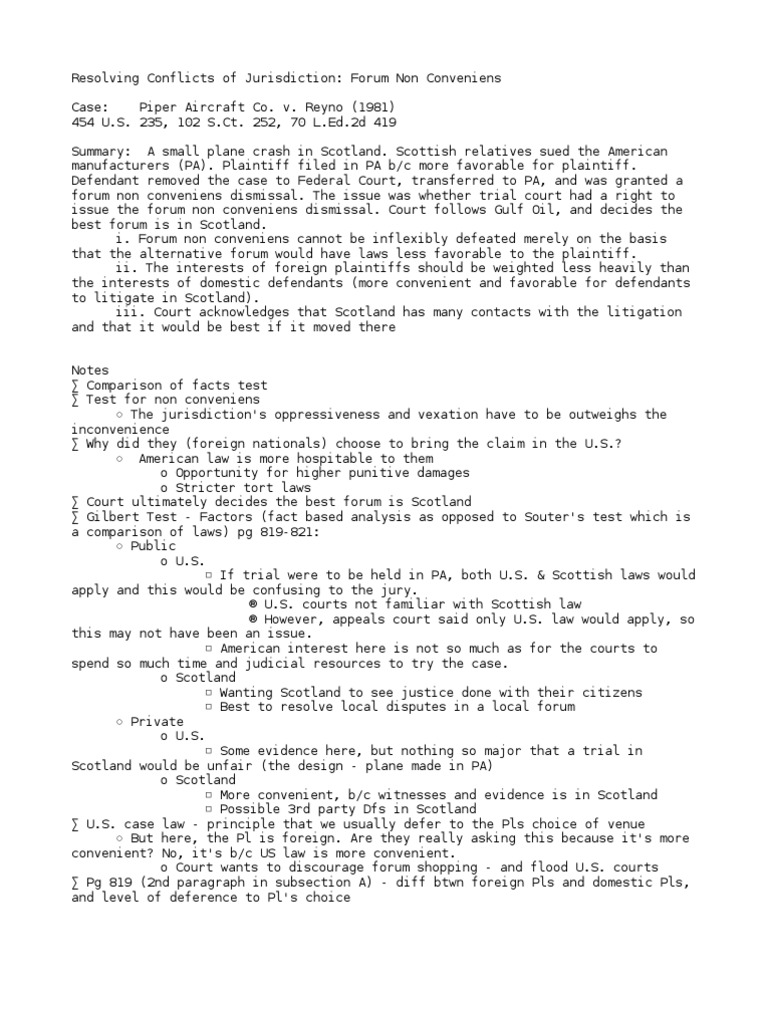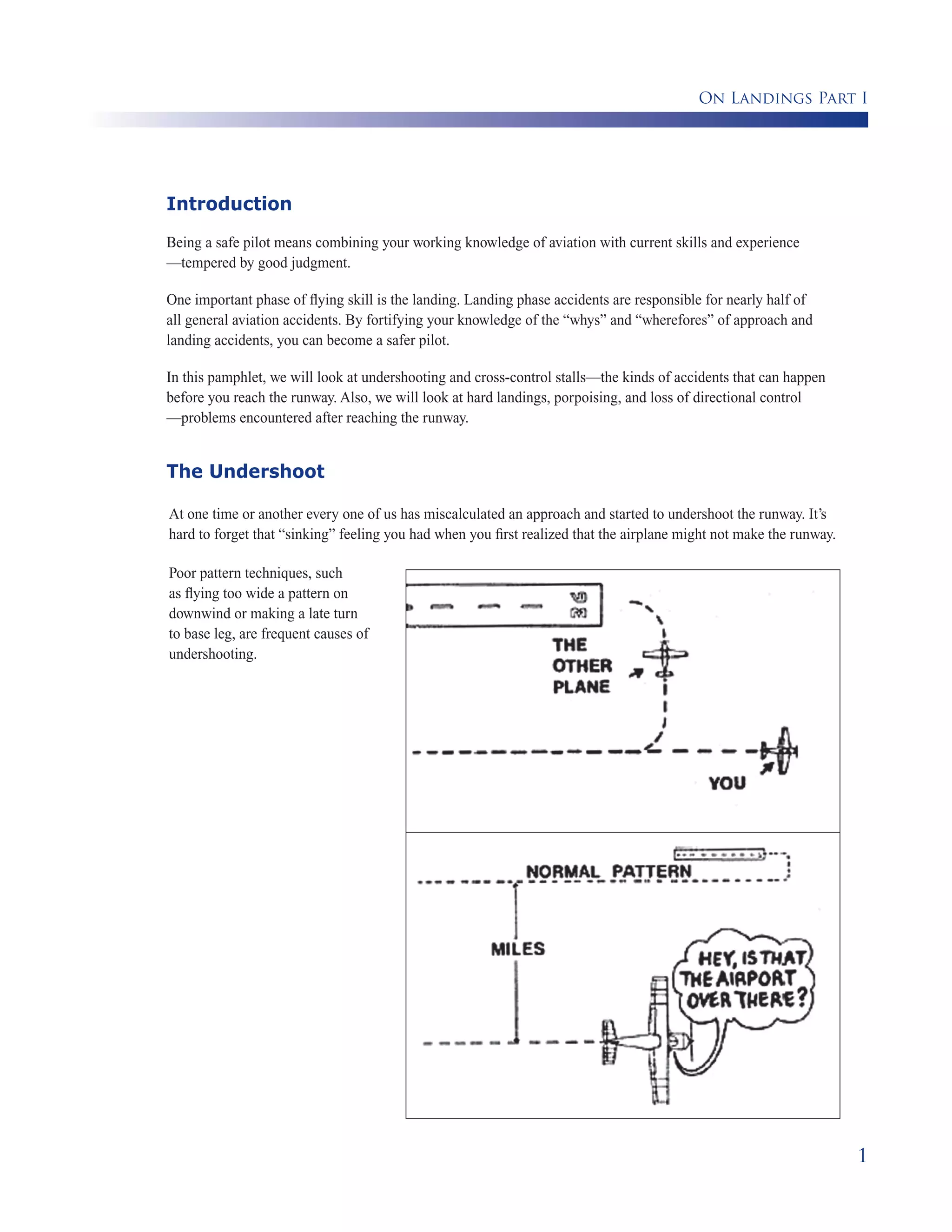Piper Aircraft Co. V. Reyno - Justia Annotations is a forum for attorneys to summarize, comment on, and analyze case law published on our site. Justia makes no guarantees or warranties that the annotations are accurate or reflect the current state of law, and no annotation is intended to be, nor should it be construed as, legal advice.
Contacting Justia or any attorney through this site, via web form, email, or otherwise, does not create an attorney-client relationship. would be provided by the Scottish courts do not fall within this category. Although the relatives of the decedents may not be able to rely on a strict liability theory, and although their potential damages award may be smaller, there is no danger that they will be deprived of any remedy or treated unfairly.
Piper Aircraft Co. V. Reyno

that, under any view of that question, it lay within the discretion of the District Court to decline to assume jurisdiction over the controversy. , , , '[T]he court will not take cognizance of the case if justice would be as well done by remitting the parties to their home forum.'"
"the courts have been less solicitous when the plaintiff is not an American citizen or resident, and particularly when the foreign citizens seek to benefit from the more liberal tort rules provided for the protection of citizens and residents of the United States."
We do not hold that the possibility of an unfavorable change in law should never be a relevant consideration in a forum non conveniens inquiry. Of course, if the remedy provided by the alternative forum is so clearly inadequate or unsatisfactory that it is no remedy at all, the unfavorable change in law may be given substantial weight;
the district court may conclude that dismissal would not be in the interests of justice. [Footnote 22] In these cases, however, the remedies that In analyzing the private interest factors, the District Court stated that the connections with Scotland are "overwhelming."
479 F. Supp. at 732. This characterization may be somewhat exaggerated. Particularly with respect to the question of relative ease of access to sources of evidence, the private interests point in both directions. As respondent emphasizes, records concerning the design, manufacture, and testing of the propeller and plane are located in the United States.
She would have greater access to sources of evidence relevant to her strict liability and negligence theories if the trial were held here. [Footnote 25] However, the District Court did not act. The Court of Appeals based its decision, at least in part, on an analogy between dismissals on grounds of forum non conveniens and transfers between federal courts pursuant to § 1404(a).
In Van Dusen v. Barrack, 376 U.S. 612 (1964), this Court ruled that a § 1404(a) transfer should not result in a change in the applicable law. Relying on dictum in an earlier Third Circuit opinion interpreting Van Dusen, the court below held that that principle is also applicable to a dismissal on forum non conveniens grounds.
630 F.2d at 164, and n. 51 (citing DeMateos v. Texaco, Inc., 562 F.2d at 899). However, § 1404(a) transfers are different than dismissals on the ground of forum non conveniens. The District Court next examined several factors relating to the private interests of the litigants, and determined that these factors pointed strongly towards Scotland as the appropriate forum.
Although evidence concerning the design, manufacture, and testing of the plane and propeller is located in the United States, the connections with Scotland are otherwise "overwhelming." Id. at 732. The real parties in interest are citizens of Scotland, as were all the decedents.

Witnesses who could testify regarding the maintenance of the aircraft, the training of the pilot, and the investigation of the accident -- all essential to the defense -- are in Great Britain. Furthermore, all witnesses to damages are located in Scotland.
Trial would be aided by familiarity with Scottish topography, and by easy access to the wreckage. (a) In analyzing the private interest factors, the District Court did not act unreasonably in concluding that fewer evidentiary problems would be posed if the trial were held in Scotland, a large proportion of the relevant evidence being located there.
The District Court also correctly concluded that the problems posed by the petitioners' inability to implead potential Scottish third-party defendants -- the pilot's estate, the plane's owners, and the charter company -- supported holding the trial in Scotland.
Pp. 454 U.S. 257-259. The District Court reasoned that, because crucial witnesses and evidence were beyond the reach of compulsory process, and because the defendants would not be able to implead potential Scottish third-party defendants, it would be "unfair to make Piper and Hartzell proceed to trial in
this forum. Id. (a) In analyzing the private interest factors, the District Court did not act unreasonably in concluding that fewer evidentiary problems would be posed if the trial were held in Scotland, a large proportion of the relevant evidence being located there.
The District Court also correctly concluded that the problems posed by the petitioners' inability to implead potential Scottish third-party defendants -- the pilot's estate, the plane's owners, and the charter company -- supported holding the trial in Scotland.
Pp. 454 U.S. 257-259. A citizen's forum choice should not be given dispositive weight, however. See Pain v. United Technologies Corp., 205 U.S.App.D.C. 229, 252-253, 637 F.2d 775, 796-797 (1980); Mizokami Bros. of Arizona, Inc. v.
Baychem Corp., 556 F.2d 975 (CA9 1977), cert. denied, 434 U.S. 1035 (1978). Citizens or residents deserve somewhat more deference than foreign plaintiffs, but dismissal should not be automatically barred when a plaintiff has filed suit in his home forum.
As always, if the balance of conveniences suggests that trial in the chosen forum would be unnecessarily burdensome for the defendant or the court, dismissal is proper. The forum non conveniens determination is committed to the sound discretion of the trial court.
It may be reversed only when there has been a clear abuse of discretion; Where the court has considered all relevant public and private interest factors, and where its balancing of these factors is reasonable, its decision deserves substantial deference.

Gilbert, 330 U.S. at 330 U.S. 511-512; Koster, 330 U.S. at 330 U. S. 531. Here, the Court of Appeals expressly acknowledged that the standard of review was one of abuse of discretion. In examining the District Court's analysis of the public and private interests, however, the Court of Appeals seems to have lost sight of this rule, and substituted its own judgment for that of the District Court.
"[w]hether, in an action in federal district court brought by foreign plaintiffs against American defendants, the plaintiffs may defeat a motion to dismiss on the ground of forum non conveniens merely by showing that the substantive law that would be applied if the case
were litigated in the district court is more favorable to them than the law that would be applied by the courts of their own nation." In July, 1977, a California probate court appointed respondent Gaynell Reyno as administratrix of the estates of the five passengers.
Reyno is not related to and does not know any of the decedents or their survivors; she was a legal secretary to the attorney who filed this lawsuit. Several days after her appointment, Reyno commenced separate wrongful
630 F.2d at 163-164 (footnote omitted) (quoting DeMateos v. Texaco, Inc., 562 F.2d 895, 899 (CA3 1977), cert. denied, 435 U.S. 904 (1978)). In other words, the court decided that dismissal is automatically barred if it would lead to a change in the applicable law unfavorable to the plaintiff.
"relative ease of access to sources of proof; availability of compulsory process for attendance of unwilling, and the cost of obtaining attendance of willing, witnesses; possibility of view of premises, if view would be appropriate to the action; and all other practical problems
that make trial of a case easy, expeditious and inexpensive." Id. at 163 (quoting Hoffman v. Goberman, 420 F.2d 423, 427 (CA3 1970)). In any event, it believed that Scottish law need not be applied. After conducting its own choice of law analysis, the Court of Appeals determined that American law would govern the actions against both Piper and Hartzell.
[Footnote 10] The same choice of law analysis apparently led it to conclude that Pennsylvania and Ohio, rather than Scotland, are the jurisdictions with the greatest policy interests in the dispute, and that all other public interest factors favored trial in the United States.
[Footnote 11] The District Court acknowledged that there is ordinarily a strong presumption in favor of the plaintiff's choice of forum, which may be overcome only when the private and public interest factors clearly point toward trial in the alternative forum.
It is held, however, that the presumption applies with less force when the plaintiff or real parties in interest are foreign. 1. Plaintiffs may not defeat a motion to dismiss on the ground of forum non conveniens merely by showing that the substantive law that would be applied in the alternative forum is less favorable to the plaintiffs than that of the chosen forum.

The possibility of a change in substantive law should ordinarily not be given conclusive or even substantial weight in the forum non conveniens inquiry. Canada Malting Co. v. Paterson Steamships, Ltd., 285 U.S. 413. Pp. 454 U.S. 247-255.
(a) Under Gilbert, supra, dismissal will ordinarily be appropriate where trial in the plaintiff's chosen forum imposes a heavy burden on the defendant or the court, and where the plaintiff is unable to offer any specific reasons of convenience supporting his choice.
If substantial weight were given to the possibility of an unfavorable change in law, however, dismissal might be barred even where trial in the chosen forum was plainly inconvenient, and the forum non conveniens doctrine would become virtually useless.
Such an approach not only would be inconsistent with the purpose of the forum non conveniens doctrine, but also would pose substantial practical problems, requiring that trial courts determine complex problems in conflict of laws and comparative law, and increasing the flow into American courts of litigation.
by foreign plaintiffs against American manufacturers. Pp. 454 U.S. 248-252. MARSHALL, J., delivered the opinion of the Court, in which BURGER, C.J., and BLACKMUN and REHNQUIST, JJ., joined, and in Parts I and II of which WHITE, J., joined.
WHITE J., filed an opinion concurring in part and dissenting in part, post, p. 454 U. S. 261. STEVENS, J., filed a dissenting opinion, in which BRENNAN, J., joined, post, p. 454 U. S. 261. POWELL, J., took no part in the decision of the cases.
O'CONNOR, J., took no part in the consideration or decision of the cases. Scotland has a very strong interest in this litigation. The accident occurred in its airspace. All of the decedents were Scottish. Apart from Piper and Hartzell, all potential plaintiffs and defendants are either Scottish or English.
As we stated in Gilbert, there is "a local interest in having localized disputes decided at home." 330 U.S. at 330 U. S. 509. Respondent argues that American citizens have an interest in ensuring that American manufacturers are deterred from producing defective products, and that additional deterrence might be obtained if Piper and Hartzell were tried in the United States, where they could be sued on the
on the basis of both negligence and strict liability. However, the incremental deterrence that would be gained if this trial were held in an The District Court's distinction between resident or citizen plaintiffs and foreign plaintiffs is fully justified.
In Koster, the Court indicated that a plaintiff's choice of forum is entitled to greater deference when the plaintiff has chosen the home forum. 330 U.S. at 330 U.S. 524. [Footnote 23] When the home forum has

3. The forum non conveniens determination is committed to the trial court's sound discretion, and may be reversed only when there has been a clear abuse of discretion. Here, the District Court did not abuse its discretion in weighing the private and public interests under the Gilbert analysis, and thereby determining that the trial should be held in Scotland.
Pp. 454 U.S. 257-261. Upholding the decision of the Court of Appeals would result in other practical problems. At least where the foreign plaintiff named an American manufacturer as defendant, [Footnote 17] a court could not dismiss the case on grounds of forum non
In previous forum non conveniens decisions, the Court has left unresolved the question whether, under Erie R. Co. v. Tompkins, 304 U.S. 64 (1938), state or federal law of forum non conveniens applies in a diversity case.
Gilbert, 330 U.S. at 330 U.S. 509; Koster, 330 U.S. at 330 U.S. 529; Williams v. Green Bay & Western R. Co., supra, at 326 U.S. 551, 326 U.S. 558-559. The Court did not decide this issue, because the same result would have been reached in each case under federal or state law.
The lower courts in these cases reached the same conclusion: Pennsylvania and California law on forum non conveniens dismissals are virtually identical to federal law. See 630 F.2d at 158. Thus, here also, we need not resolve the Erie question.
The Court of Appeals also erred in rejecting the District Court's Gilbert analysis. The Court of Appeals stated that more weight should have been given to the plaintiff's choice of forum, and criticized the District Court's analysis of the private and public interests.
However, the District Court's decision regarding the deference due plaintiff's choice of forum was appropriate. Furthermore, we do not believe that the District Court abused its discretion in weighing the private and public interests. In other words, Gilbert held that dismissal may be warranted where a plaintiff chooses a particular forum not because it is convenient, but solely in order to harass the defendant or take advantage of favorable law.
This is precisely the situation in which the Court of Appeals' rule would bar dismissal. Held. The Court of Appeals erred in holding that plaintiffs may defeat a motion to dismiss on the ground of forum non conveniens merely by showing that the substantive law that would be applied in the alternate forum is less favorable to the plaintiffs than that of the present forum.
The possibility of change in substantive law should not be given conclusive or even substantial weight in the forum non conveniens inquiry. A plaintiff's choice of forum is given greater weight when the plaintiff has chosen the home forum.
The forum non conveniens determination is committed to the sound discretion of the trial court, and may be overturned only when there has been a clear abuse of discretion. The reasoning employed in Van Dusen v.

Barrack is simply inapplicable to dismissals on grounds of forum non conveniens. That case did not discuss the common law doctrine. Rather, it focused on "the construction and application" of § 1404(a). 376 at 376 U.S. 613. [Footnote 20] Emphasizing the remedial
Respondent argues that since plaintiffs will ordinarily file suit in the jurisdiction that offers the most favorable law, establishing a strong presumption in favor of both home and foreign plaintiffs will ensure that defendants will always be held to the highest possible standard of accountability for their purported wrongdoing.
. However, the deference accorded to a plaintiff's choice of forum has never been intended to guarantee that the plaintiff will be able to choose the law that will govern the case. See supra at 454 U.S. 247-250.
I join Parts I and II of the Court's opinion. However, like JUSTICE BRENNAN and JUSTICE STEVENS, I would not proceed to deal with the issues addressed in 454 U. S. To that extent, I am in dissent.
The doctrine of forum non conveniens has a long history. It originated in Scotland, see Braucher, The Inconvenient Federal Forum, 60 Harv.L.Rev. 908, 909–911 (1947), and became part of the common law of many states, see id.
at 911-912; Blair, The Doctrine of Forum Non Conveniences in Anglo-American Law, 29 Colum.L.Rev. 1 (1929). The doctrine was also frequently applied in federal admiralty actions. See, e.g., Canada Malting Co. v. Paterson Steamships, Ltd.; see also Bickel, The Doctrine of Forum Non Conveniences As Applied in the Federal Courts in Matters of Admiralty, 35 Cornell L.Q.
12 (1949). In Williams v. Green Bay & Western R. Co., 326 U. S. 549 (1946), the Court first indicated that motions to dismiss on grounds of forum non conveniens could be made in federal diversity actions.
The doctrine became firmly established when Gilbert and Koster were decided one year later. See Affidavit of Ronald C. Scott, App. to Pet. for Cert. of Hartzell Propeller, Inc., A75; Affidavit of Charles J. McKelvey, App.
to Pet. for Cert. of Piper Aircraft Co. 1f. The affidavit provided to the District Court by Piper states that it would call the following witnesses: the relatives of the decedents; the owners and employees of McDonald's;
the persons responsible for the training and licensing of the pilot; the persons responsible for servicing and maintaining the aircraft; and two or three of its own employees involved in the design and manufacture of the aircraft.
piper v reyno case brief, piper airplanes models, piper planes for sale, piper tri pacer, piper pa 12 for sale, piper aircraft v reyno quimbee, piper pa 31 for sale, piper chieftain for sale







/cloudfront-us-east-2.images.arcpublishing.com/reuters/JHV6PTM67NIGFBDMDAS5IRFCWY.jpg)




















